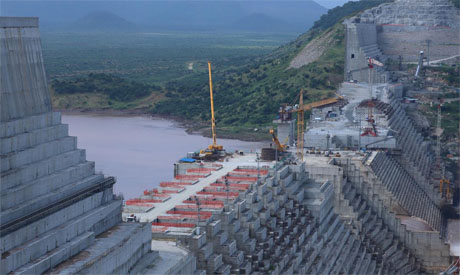
A general view of the the Grand Ethiopian Renaissance Dam (GERD), near Guba in Ethiopia (AFP)
A draft deal prepared by the US Treasury Department on the mechanism of filling and operating the Grand Ethiopian Renaissance Dam (GERD) has been sent to Sudan, Egypt, and Ethiopia, according to Sudanese officials.
"The three countries received the draft to be considered ahead of the next round of negotiations set to be held in Washington on 28 February," AFP quoted Sudanese irrigation minister Yasser Abbas as saying.
At a press conference held in Khartoum on Monday, Abbas revealed that the three parties reached a consensus on about 90 percent of the outstanding points related to the filing and operating the dam and the rest are only technical points.
He added that the draft is the result of negotiations that lasted for years between the three parties.
According to the Sudanese legal negotiator Hisham Kahn, the draft contains provisions about the safety of the dam during the operation process and about the means proposed to resolve the disputes that could arise between the three countries.
Earlier this month, Egypt, Ethiopia, and Sudan agreed to entrust the US and the World Bank with the preparation of the final agreement on the filling and operation of the Ethiopian dam to be signed by the end of this month, a joint statement by the five parties read.
However, US Secretary of State Mike Pompeo said last week that it could take "months" to resolve the dispute between Ethiopia and Egypt over the massive dam on the Nile.
The US stepped up to host negotiations in November after the three countries announced that talks had reached a dead end, and after Egypt asked for an international mediator.
Ethiopia hopes that the massive $4.8 billion project on the Blue Nile, which has been under construction since 2011, will allow it to become Africa’s largest power exporter, but Cairo fears the project will diminish its water supply from the Nile, a lifeline for a country of 100 million people.
Short link: